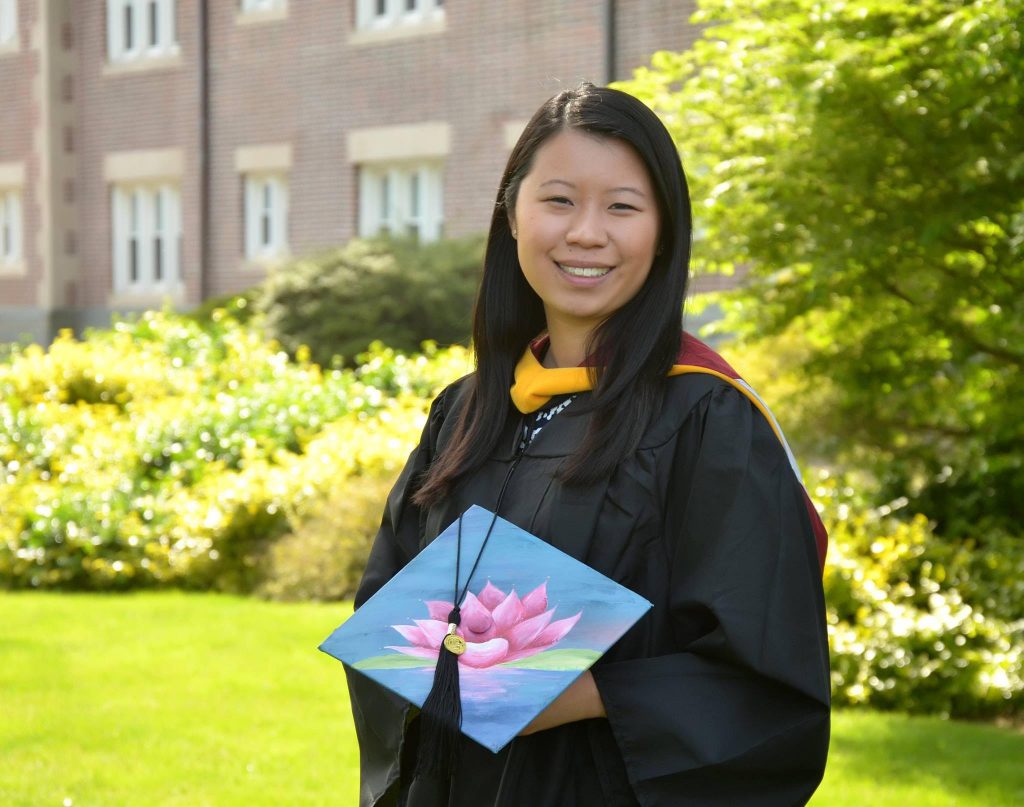

Julia Burns may not quite know where she’s headed as she continues her professional journey toward a doctorate from Philadelphia College of Osteopathic Medicine, but she knows how and why she’s there, thanks to a childhood that would test the energy, drive and resolve of the most hardened adults.
“My parents met later in life and they decided to go through having a kid and then going the adoption route as well,’ Burns explained during a conversation with the Sun last month. “The adoption yielded me, and at the same time, they were pregnant with my younger sister, Rose. We’re just under a year apart in age.”
Rose was born with Prader-Willi Syndrome, a genetic condition that affects the part of the brain that produces hormones and regulates growth and appetite.
“They started noticing her missing developmental milestones fairly early on and found out how the disease was rare: only 1 in 10,000 get it, and it was relatively unheard of, but they did great work in early intervention and a proper diagnosis,” Julia revealed.
“Their learning curve to care for her was definitely prominent in my younger years. That’s the beginning of my journey, and it became my new normal.”
Julia was able to help with her sister’s external health care needs, including, as she progressed through high school and was able to drive, shuttling Rose back and forth to doctor’s appointments. That sisterly bond and attention to detail enabled Julia to gain valuable skills beyond mere health and welfare.
“I learned how to be hypersensitive to certain situations and new environments,” Julia noted. “For instance, I can read a room to prevent any potential situation from escalating, and that’s a skill that I kind of learned throughout those years.
“I grew a lot by being in the family I’m in and to navigate things in that way,” she added. “We started with a locked fridge, and then a locked pantry, which is what (Rose) needed, because she was in a constant state of starvation and will always search for food.”
Julia, who came to Cherry Hill from Woodbury during elementary school, graduated from East in 2012 and then from Muhlenberg College four years later. While it wasn’t a lock that she’d pursue medicine because of her environment, it was a significant factor in choosing a career.
“It was a combination of three things: experience with my younger sister, my parents who were teachers who were into art and history and being adopted,” she said.
“From the ages of 10 to 21, I attended camp where campers and staff are adopted and are international adoptees, like me,” Julia added. “It was a unique thing where I lived, but at camp it was normal. To hear about adoption and adoptees and hearing their experiences fueled my desire to help people and led me to health care.”
Showing rare maturity for young adults, Julia decided to take a year away from her academic journey, snagging an internship at Somalogic, a clinical diagnostic company based in Boulder, Colorado.
“I didn’t feel I was ready to go into medicine yet,” she related. “It was a paid position, so I was very lucky to have it. And Boulder was an amazing place to spend my gap year, to get away from everything I’d known to that point, before continuing on my educational journey.”
Going further out of her comfort zone, Julia served as the model for the illustration of a soon-to-be released children’s book called “Tiny or Tall, Mighty or Small – Music for All!” It promotes body positivity in school-age children.
“For the second year of my master’s, I was in the public health program at both PCOM and Jefferson,” she recalled. “One of the girls in that cohort lived in my building and she told me about the MPH (master’s of public health) she was doing, which was a children’s book on body awareness and body positivity. She was in the process of writing, but she didn’t have an illustrator for it.
“She wanted someone who was skilled, and I thought I could handle it,” Julia added. “That’s how I got on board and ended up being the illustrator. Doing little things like this, is the way I won’t get burned out, to be able to function beyond the patient and the patient’s room.”
Having completed her master’s degree in biomedical sciences, and now able to see the finish line before entering the real world once more, Julia’s professional path is coming into greater focus. Giving back to the next generation of health-care professionals is bound to play a large part.
“I’m the AMWA (American Medical Women’s Association) president, and I love the ability to support groups of students on campus and empower fellow women both personally and professionally,” she said.
“And I really enjoy the mentoring aspect for students at different levels; whether I end up at a teaching hospital or not, I can see that as a valuable service. I’m pretty open (to different work environments), but mentorship and teaching will be something that’s going to continue no matter where I go.”









